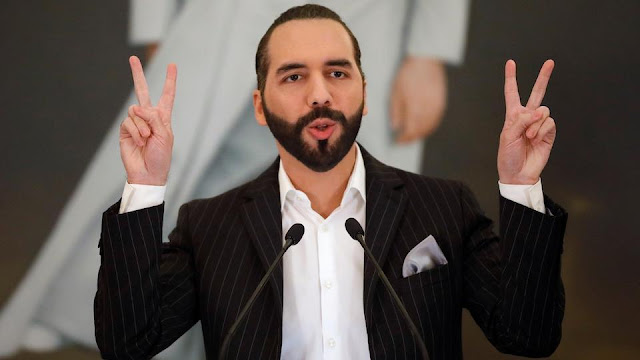 |
| El Salvador President Nayib Bukele speaks during a news conference in San Salvador, El Salvador on June 6, 2021. (Reuters) |
El Salvador's President Nayib Bukele said that he will send a bill to Congress next week to make bitcoin legal tender in the Central American nation, touting its potential to help Salvadorans living abroad send remittances home.
El Salvador President Nayib Bukele has announced in a recorded message played at a Bitcoin conference in Miami that next week he will send proposed legislation to the country's congress that would make the cryptocurrency legal tender in the Central American nation.
The 39-year-old president, who has maintained approval ratings above 90% and made Twitter his preferred way of communicating, characterised it as an idea that could help El Salvador move forward.
“Next week I will send to Congress a bill that will make Bitcoin a legal tender in El Salvador," Bukele said.
“In the short term this will generate jobs and help provide financial inclusion to thousands outside the formal economy and in the medium and long term we hope that this small decision can help us push humanity at least a tiny bit into the right direction.”
Welcome to the future 🇸🇻 #Bitcoin pic.twitter.com/j30vcZVXvJ
— Nayib Bukele 🇸🇻 (@nayibbukele) June 5, 2021
The US dollar is El Salvador's official currency. About one quarter of El Salvador's citizens live in the United States and last year, despite the pandemic, they sent home more than $6 billion in remittances.
Bukele's New Ideas party holds a supermajority in the new congress seated May 1, giving any legislative proposal from the president a strong likelihood of passage.
Additional details of the plan were not released. But Bukele in subsequent messages on Twitter noted that Bitcoin could be “the fastest growing way to transfer 6 billion dollars a year in remittances.” He said that a big chunk of those money transfers were currently lost to intermediaries and with Bitcoin more than a million low-income families could benefit.
READ MORE: Bitcoin's untenable volatility sees its price drop by almost 50%
Informal economy
He also said 70% of El Salvador's population does not have a bank account and works in the informal economy. Bitcoin could improve financial inclusion, he said.
Riding his high popularity and his party's dominance performance in February 28 elections, Bukele has concentrated power. His party's supermajority in congress ousted the justices of the Constitutional Chamber of the Supreme Court May 1. They then replaced the attorney general.
They had been critical of some of Bukele's more drastic measures during the pandemic, including a mandatory stay-at-home order and containment centers where those caught violating the policy were detained.
While enjoying a positive relationship with former U.S. President Donald Trump, Bukele has had a much more tense relationship with the administration of President Joe Biden.
Last month, the White House Special Envoy for the Northern Triangle Ricardo Zuniga said during a visit to El Salvador that the U.S. government would like to see El Salvador reverse the moves against the court and the attorney general. Bukele said that would not happen.
Bukele's concentration of power, attacks on critics and open disdain for checks on his power have raised concerns about El Salvador's path. However, Bukele has a wide base of support in part due to the utter failure of the country's traditional parties who ruled during the past 30 years to improve people's lives and to his ability to provide short-term benefits.
Bukele has been praised for aggressively obtaining Covid-19 vaccines and running an efficient vaccination program far more successful than El Salvador's neighbors.
Comments
Post a Comment